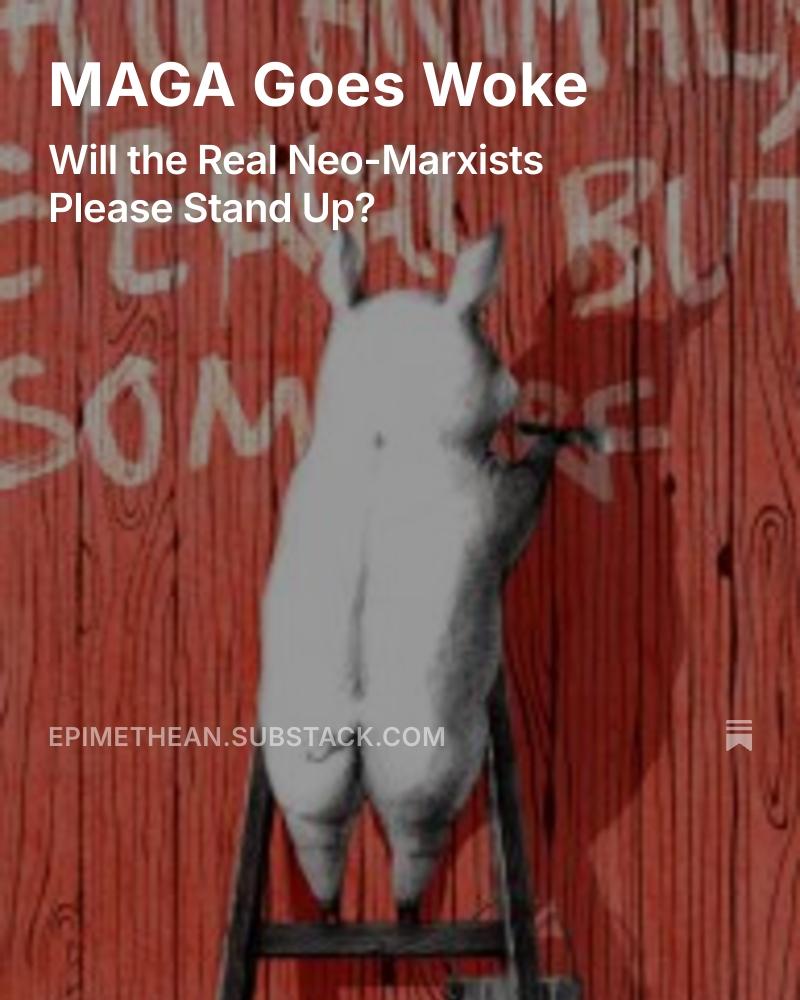
I wish I could answer the last question in the affirmative, but alas, the woke right is not only a real thing, but is quickly metastasizing at the highest level of the mainstream Republican establishment. The way I’ve explained this weird phenomenon it in a recent Substack article is as follows.
To be “woke”, whether in its left-wing or right-wing manifestation, is to embrace political models in which all political activity is, at root, struggle for group power. That’s where identity politics comes in. Whether from the right or the left, identity politics offers a posture toward society that collapses all discourse into competition for power, so that every issue becomes a zero-sum competition between winners and losers. This is an outworking of critical theory in which the victim-oppressor framework becomes the lens for understanding all academic disciplines and societal movement. Within the discipline of politics, this framework eschews classic political virtues such as consensus building, professionalism, and compromise, in favor of a rhetoric of contempt in which politics becomes a tool for the assertion of dominance. Often fueled by post-truth epistemologies like perspectivism or functional relativism, this framework undermines The True by fortifying the notion that our very view of reality is necessarily conditioned by the matrix of group-identity. This idea, often referred to as “standpoint epistemology,” asserts that the only legitimate ways of knowing are from inside group ideology; consequently, the difference between what is real news vs. fake news comes down to what tribe you identify with.
But even as identity politics tethers The True to the matrix of group identity, it also deconstructs The Good. Thus we are seeing (and I chronicle this trend in the aforementioned Substack post) common-good conservatism being systematically replaced by a politics that eschews the common good for a Nietzschean might-makes-right modus operandi rooted in grievance narratives. Consider the curious phenomenon (which, again, I have noted elsewhere) that when President Trump is asked to defend policies or ideas, he often merely retreats to a version of Thrasymachus’s argument in Plato’s Republic: that justice is the advantage of the stronger. The reason so many conservatives see this neo-Nietzscheanism as liberating rather than merely cynical is because of the narrative provided by identity politics. The narrative—whether from the woke left or the woke right—asserts that there is systemic structural dynamic to delegitimize people of particular groups, and that this matrix of oppression renders the normal canons of fair play no longer adequate tools for redress. This, in turn, opens up space to address conflict via witch-hunting, scapegoating, mob-like behaviors, along with ever-tightening in-groups defined by ideological purity.
You can read my entire piece at my Substack.
Those of you who have already read this, may be interested in the following addendum that I added today at the end of the piece, following some pushback.
It’s interesting that the push-back in my critique against identity politics is coming from the right. That shows how much the Overton window has shifted.
One person was concerned that my denial of standpoint epistemology coupled with my belief that there is such a thing as the common good, assumes a classical neutral ground, free from biases, from which to pursue the common good and construct a conservative society. But this view from nowhere—again, summarizing my interlocuters—fails to account for our embeddedness in ethnic, sociological, and economic situations that inevitably color our political and societal interactions.
I agree there is no perspective from nowhere – no neutral rationality that is free from context, whether ethnic, sociological, economic, or otherwise. On the contrary, it is only because Christ is the king of the universe that there can be a rationality, justice, and common good that is larger that mere interest groups. That is why standpoint epistemology and identity politics (whether in its right-wing or left-wing variety), ultimately fails. They fail because we worship a risen and ascended Lord who is now king of the cosmos, and who sent his Spirit at Pentecost. Christ’s kingship does not abolish the distinctions between cultures and ethnicities; rather, grace transforms (not obliterates) nature, and part of that transformation is that Christianity has problematized the very notion that peoples are necessarily locked in a zero-sum competition for power, or that ways of knowing and communicating are hermetically sealed within the self-enclosed matrix of tribal identity. What complementarianism did in answering certain variants of feminism (namely, by showing that the sexes really are different but gloriously harmonious), the doctrine of Ascension and Pentecost does for culture and ethnicity, for it shows that the different cultures and ethnicities are gloriously different but can live in harmony, in complementarity. That possibility of harmony, in turn, can inform out politics, as we eschew the framework of identity-politics that would problematize the very idea of a common good.
Maybe it would help to put my argument into historical context. Ancient pagans believed they were part of an unavoidable division between different races, tribes, and people groups. This came as an inevitable consequence of polytheism. In ancient polytheistic societies, each tribe, ethnic group, and nation believed themselves to be associated with particular deities that warred in the heavens with the gods of the other nations. The warfare between the gods expressed itself in fighting among the tribes to which they were attached. This is pervasive through the literature of the Ancient Near East, including Homer’s Iliad and the Old Testament. Because the gods and their associated nations were locked in a zero-sum conflict for domination, each group sought to use violence to prove that their god was supreme over the other gods. This perspective brought very specific ideas of guilt and expiation, whereby one group could only have their guilt expiated by becoming the target of cathartic rage from their rival group. Accordingly, pagan justice involved one group triumphing over another. Because races and tribes were seen to be locked in inevitable conflict, justice for one group could only involve injustice to your group, and vice versa. In this primitive perspective, there is no concept of the common good that can unite people across groups, nor a normative framework that can be appealed to in the adjudication of disputes. All that exists is raw power.
Christianity largely did away with this pagan perspective, at least in the lands influenced by Christian culture. The message of Pentecost was the unity of all men and women in Christ, and the ongoing work of creation against the forces of chaos and division. The gospel taught that a person is no longer defined primarily by their group, but by being a new creature in Christ. While Christianity did not abolish conflicts between groups (there is a long history of Christian nations warring against other Christian nations, let alone conflict between Christians and non-Christian nations), it redefined the terms of engagement. Thus, a recurring theme in political texts throughout the medieval era, which had been completely lacking in the ancient world, is that instead of justice being a zero-sum contest between warring factions, divine justice brings people of different tribes and nations to live in harmony with His order. By living in harmony with God, we are able to live in harmony with one another, at least in principle. Although the reality of worldwide harmony will not be realized until the New Heavens and the New Earth, Christians anticipate this by following Paul’s injunction in Romans 12:18 to try to live peaceably with all men.
But this Christian approach began to sustain considerable challenge during the age of revolutions that followed the eighteenth-century Enlightenment. Starting with the French Revolution through to the various Communist revolutions that occurred throughout the twentieth century, there resurfaced the pagan idea that the world is an inevitable battleground for competition between warring factions, and that we cannot escape the conflicts tied to group-identity. For example, in the French Revolution there was a zero-sum struggle for supremacy between the aristocrats and those representing the common people and citizens. The Marxist revolutions, on the other hand, organized people based on their relation to the economy (for example, proletariat and bourgeoisie), and then taught that these classes are locked in a zero-sum struggle for supremacy. The Fascist revolutions of the twentieth century taught that there was an inevitable zero-sum conflict between races (for example, between the Aryan races and those of “impure” pedigree). In all such cases, the revolutionary ideology allows no possibility, even in principle, for compromise; there is no common justice that can unite warring factions, because there can only be winners and losers. According to these post-Christian political philosophies, the group to which you belong automatically defines you, whether you want it or not. Significantly, what we know as “conservatism,” grew out of European thinkers opposing these revolutionary ideas. Men like Edmund Burke appealed to principles of the spiritual life and natural law (in the case of Burke, natural law, not natural rights – two very different things) that were transcendent and thus prior to mere group identity.
The most recent manifestation of group-based revolutionary ideas is the cluster of ideas within the ecosystem of wokeness, including identity politics and standpoint epistemology. This narrative is that we are all trapped in the micro-narrative of our particular group with no ability to pursue a common good or a common justice that can unite peoples; there is no transcendently real or objective vantage point to assess competing constructions of reality because everyone is trapped in the construction of their own group, locked in power games against the agendas of other groups, often defined in terms of race, gender, sexuality or ideology. Mutual incompressibility between different groups is perceived not as an unfortunate observation of a state of affairs that needs to be problematized, nor a phenomenon of the sinful condition that we should work to dismantle through a Christ-centered political vision, but an inescapable norm that we should flow with.


